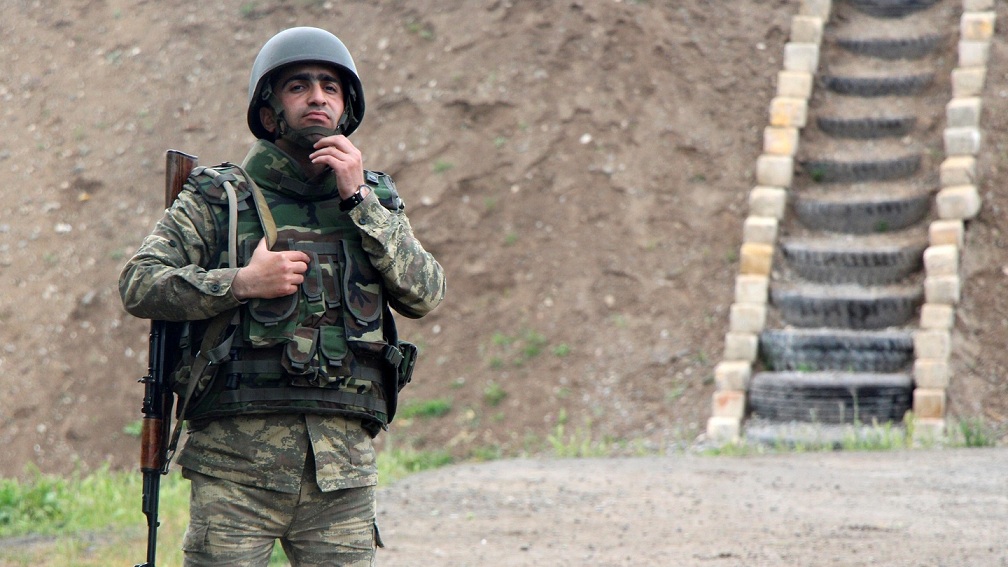One of the post-Soviet world’s ‘frozen conflicts’ has come into the limelight again this week, when Armenian armed forces made an attempt to encroach into neighboring Azerbaijan on Sunday.
Azerbaijan’s Ministry of Defense reported that Armenian troops attempted to invade Azerbaijan’s frontline position located in Azerbaijan’s northwestern Gazakh district, which shares a border with Armenia. After an Armenian UAZ military vehicle was spotted by Azerbaijani forces, they were forced to return to their positions. The vehicle was left on the scene, and demolished by Armenian forces with heavy machine gun fire.
Hikmat Hajiyev, a spokesperson at Azerbaijan’s foreign ministry, said the provocation by Armenian armed forces is another example a policy by the South Caucasus country, which, like Azerbaijan, became independent with the collapse of the Soviet Union in 1991, to impede a peaceful settlement to the Nagorno-Karabakh conflict.
“Armenia is pursuing a goal in every possible way to impede the progress of the negotiation process,” Hajiyev told Trend news agency on February 12. “This, once again, shows that the presence of the Armenian armed forces in the occupied territories of Azerbaijan remains a serious threat to regional security and peace.”
The two countries have been at odds since the late 1980s, when the USSR’s fate was all but finalized and Armenia looked to take over Azerbaijan’s Nagorno-Karabakh region, due to its partially ethnic Armenia population alongside indigenous Azerbaijanis.
In 1991, shortly after independence, Armenia launched an all-out military campaign to capture the Nagorno-Karabakh region, which is an integral part of Azerbaijan’s internationally recognized territory, and in the processes managed to occupy it and seven surrounding districts, totaling about 20 percent of Azerbaijan’s land mass. The war, which lasted until a ceasefire in 1994, killed over 20,000 Azerbaijanis and displaced one million others.
The areas taken by Armenia remain occupied to this day, despite four UN Security Council resolutions, all passed in 1993, calling for Armenia’s full withdrawal from the occupied territories. Azerbaijan maintains that any settlement to the conflict require a change to the status quo, namely that the resolutions be put into effect and all of Armenia’s forces withdraw.
“To achieve progress in the political settlement of the conflict, it is necessary to ensure the withdrawal of Armenian troops from the occupied lands of Azerbaijan and to change the current status quo based on the occupation,” Hajiyev said.
International efforts have been made to find a lasting peace, including that by the Organization for Security and Cooperation in Europe (OSCE), whose Minsk Group co-chaired by Russia, the United States and France is tasked with finding an end to the conflict. Despite the peace mediation by the group between Azerbaijan and Armenia since 1994, Azerbaijan’s territories remain occupied by Armenia.
The OSCE Minsk Group co-chairs visited Azerbaijan and Armenia last week, where they met with the authorities of both countries to deliberate the current status of the conflict.
Hajiyev attributed Armenia’s actions on Sunday to the group’s trip.
“Practice shows that if specific issues related to the settlement of the Armenian-Azerbaijani Nagorno-Karabakh conflict are discussed during the visit of the OSCE Minsk Group co-chairs to the region, the Armenian side resorts to diversionary, provocative attempts of various kinds,” he said.
“We once again witnessed this in June-July 2017, when, after the visit of the OSCE Minsk Group co-chairs to the region, the Armenian side committed provocations of a military-political nature. As a result of these provocations, on July 4, a two-year-old girl Zahra Guliyeva, along with her grandmother, were killed in the Alkhanli village of Fizuli region of Azerbaijan.”







 Iran's senior military leaders described the drone and missile attack on Israel on April 14 night as “successful".
Iran's senior military leaders described the drone and missile attack on Israel on April 14 night as “successful".
 The number of evacuees from flooded areas in Kazakhstan has reached 97,852 people, including about 32,856 children since March 27.
The number of evacuees from flooded areas in Kazakhstan has reached 97,852 people, including about 32,856 children since March 27.
 Iranian President Ebrahim Raisi warned Israel that it would face a "real and extensive" response if it makes any "mistake" following Tehran’s missi...
Iranian President Ebrahim Raisi warned Israel that it would face a "real and extensive" response if it makes any "mistake" following Tehran’s missi...
 The Kazakh authorities have increased their arbitration claims against international oil companies involved in the development of the Kashagan oil ...
The Kazakh authorities have increased their arbitration claims against international oil companies involved in the development of the Kashagan oil ...



